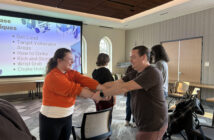I’m crazy.
Ask anyone. When you meet me, I bet the first word that comes to mind is “crazy.”
This phrase has become my prevailing descriptor for the majority of my college career. I have a big, loud, opinionated personality. Chaos follows me whether I want it to or not.
My “craziness” is something I’ve always been hyperaware of and, when people bring it to my attention, it can sometimes make me feel more self-conscious than I already am. The fact that my personality is constantly brought up with a negative descriptor doesn’t exactly make me think it’s a good thing.
I can’t be the only one who feels disoriented by getting defined this way. What does “crazy” actually mean? Is it a bad thing?
According to the online etymology dictionary, in the 1570s, crazy meant “diseased, sickly.” In the 1580s, it meant “broken, impaired, full of cracks or flaws.” In the 1610s, it took the form of what it means today: “deranged, demented, of unsound mind or behaving as so.” By 1927, it meant “cool, exciting” in a jazz slang sense.
Now, when you Google “crazy,” the definition is “mentally deranged, especially as manifested in a wild or aggressive way.”
Looking at its origins, “crazy” has an overwhelming negative connotation, but it has also lost most of its literal meaning through its many transformations.
When someone tells me, “You’re crazy,” I immediately follow with, “In a bad way?”
The answer is always no (that is, if they mean it).
So, when did “crazy” become a positive descriptor? How has a word used to describe mentally ill people developed into a positive — and common — compliment?
I think one contributor is how our generation fetishizes mental illness and often tries to compete with each other’s mental instability.
We have become so good at making our mental health a competition about who has it worse. You’ve had a bad day? Too bad, my day was worse.
People tend to make their negative emotions something to brag about, which has made most people lean into the archetype of making their problems their personality. I won’t lie, I have fallen victim to this, too.
The normalization of mental illness has led us to think of it in a positive light. If everyone around us is unwell, no one is. Isn’t it a good thing if we all have the same experiences?
There are articles on the internet that argue the use of “crazy” is insensitive to people who struggle with mental illness and is misogynistic. And while I agree with both of these claims, I also think there is a simpler answer: people lack vocabulary.
It’s telling when someone calls me “crazy” and my first instinct is to ask a follow-up question. The word is not self-explanatory.
In my experience, “crazy” is never used accurately. There’s always better, more precise language that can be used as a replacement.
When we use this broad word, it never satiates the listener. If anything, it prompts more questions.
We are really good at taking words and applying them to a million different contexts and meanings, which leads to more misunderstandings and confusion.
Take “slay,” for instance. You can virtually follow any statement with “slay!” and no one bats an eye (I have fallen victim to this, trust me).
But just like “crazy,” what are we actually saying? Do we lack the vocabulary or just use the words easiest and most common to us at the time?
I don’t think our short attention spans and bloated egos can allow us to explain our actual feelings or opinions. It’s so much easier to slap a “they’re crazy” reaction onto something rather than engage in the conversation and truly understand one another.
People find it more convenient to remain disconnected because empathy exhausts people. We’re too caught up in our own heads trying to make it through the day to expend more energy trying to find exactly the right word to describe our thoughts.
If we can appear to be invested in people’s lives without actually investing, why would we ever change? We get the best of both worlds by remaining self-absorbed but appearing not.
We are suckers for buzzwords and friendly phrases to make ourselves seem relatable rather than engaged.
That’s human nature, and I don’t know if we’ll ever change. I hope we do, for the sake of my constant confusion.
In the meantime, are there any other words that can replace “crazy?” Absolutely.
Fanatical, passionate, zealous, energetic, enthusiastic. I feel I am all of these things at once.
So please, for me, define “crazy” next time you feel the need to blurt it out — because I will drive myself crazy trying to figure it out what you mean.






Comment policy
Comments posted to The Brown and White website are reviewed by a moderator before being approved. Incendiary speech or harassing language, including comments targeted at individuals, may be deemed unacceptable and not published. Spam and other soliciting will also be declined.
The Brown and White also reserves the right to not publish entirely anonymous comments.
1 Comment
I decided to climb out of this k hole and look up crazy… this is starting to make a lot of sense. SLAY!